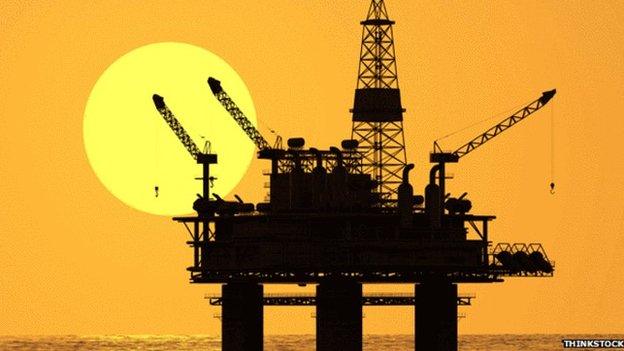Subdued anniversary for offshore oil
- Published

It will be 40 years tomorrow since the first North Sea oil came ashore in Britain. It was from the Argyll field, and landed by tanker at the Isle of Grain refinery in Kent.
The trickle became a torrent later that year, 1975, when the Queen pushed the button on the Forties pipeline.
There followed a vast engineering effort, making the technology being pioneered in Scotland's north-east and Northern Isles a global centre for the new offshore frontier. It's been compared to the enormous achievements of the Victorian engineers, but much of it out of sight.
It brought many jobs, and some terrible tragedies in the risky venture of tapping into the North Sea's black gold. With more than 40 billion barrels extracted so far, it also brought tax revenue - many tens of billions of pounds.
You don't have to be a supporter of Scottish independence to ask if it was wise to spend that as it came in, rather than amassing a vast trust fund, as Norway did.
Stretching reserves
Today and tomorrow, in Aberdeen, the industry gathers for an annual conference, to take stock of the first 50 years since exploration began (the first gas find was in September 1965) and four decades since oil began to flow.
More significant and time-consuming will be the questions about how to stretch the remaining reserves for another 40 or 50 years.

The industry meets at a very challenging time.
When Oil and Gas UK, the trade body, convened this conference last year, the oil price was about to start its slide from $115 per barrel. By January, it hit $45. It's now in the mid-60s, with conflicting signs of its future direction of travel.
Few think it will rise much above $70, because that's the point at which fracking starts again in North America, pushing up supply. Fracking is much more responsive to price than offshore producers can afford to be.
That plunge in the value of this asset has focused attention on the problem of the high cost of operating in British waters. Along with some North American reserves of oil and gas, this is seen in a global context as among the most expensive places to operate.
Unfinished business
Costs per barrel have been rising very steeply; partly because fewer barrels are flowing from older, smaller and hard-to-reach reserves: as old equipment needs more and longer shutdowns for maintenance: and partly because the industry had become inefficient through recent years of booming investment.
Much of the talk in Aberdeen this week will be about driving those costs down further, including the tax bill. Frustration about tax, along with regulation, was found to have soared in a recent survey of industry concerns in north-east Scotland.
However, the industry's requests for reduced tax were largely answered in George Osborne's March Budget. The unfinished business is on incentives for exploration, which has been particularly weak of late, and eventually removing Petroleum Revenue Tax altogether.
A recent analysis by Edinburgh-based energy consultancy Wood Mackenzie reckoned that drilling costs could be one third down by the end of next year. Much of that is in the cost of hiring a rig, which has always been very volatile.
Operating costs are on track to fall by up to 15% in the UK sector, according to WoodMac, and development costs for new investments by between 10% and 20%. If the price per barrel is to stay in the $60 range, these percentages may have to get bigger, and one area of tension is where they erode pay and conditions for offshore workers.
Common interest
Those attending can expect to hear industry talk about how to co-operate on operations and investments in future - shared services, using standardised fittings and repeat designs rather than bespoke, holding inventories in common, and sharing hardware such as pipelines.
The industry talk is also about regulation. Whereas it's been carried out from Whitehall until now, Sir Ian Wood's review of what has to be done for "Maximising Economic Recovery" has led to an independent, Aberdeen-based regulator.
At its head is Andy Samuel, who will be a star turn at the conference. He has clout, and a remit to force operators to work together and more efficiently in the common interest of the industry and taxpayer. Offshore bosses are eager to hear how he's going to use that clout.
It's been noted before that the alignment of interests between industry and government are no longer as clear as they were. There are tensions around the next phase for the North Sea as it moves into this new era, of lower prices, lower profits, lower tax and lower costs.
Now entering its 50s, the industry may pay special attention to a conference session on Thursday afternoon entitled "Maintaining Focus in Late Life"